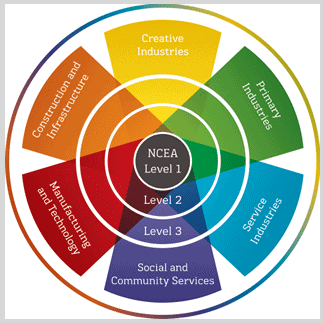Welcome to the NCEA Universe, Parents!
Hello, amazing parents of New Zealand! Are you ready to navigate the seas of knowledge your kids are sailing through in their high school years? The National Certificate of Educational Achievement (NCEA) can seem like a giant squid of a system to get your head around, but worry not! This cheerful guide is here to enlighten you about what NCEA is, how it works, and how you can support your child through this exciting journey.
What is the NCEA?
The NCEA is New Zealand’s main national qualification for secondary students in years 11 to 13. It’s recognized for its flexibility and encourages a wide range of learning experiences. Your kids will love that they can earn credits from both traditional academic subjects and practical skills – it’s like a Sundae with all their favourite toppings!
Understanding NCEA Levels and Credits
Think of NCEA levels like stepping stones across a bubbling stream – each one taking your child closer to their goals. There are three levels in the NCEA framework:
- NCEA Level 1 – typically tackled in year 11 and requires 80 credits.
- NCEA Level 2 – usually in year 12, also needing 80 credits, with at least 60 from Level 2 or above.
- NCEA Level 3 – aimed for in year 13, with—you guessed it—another 80 credits, with 60 from Level 3 or above.
Credits are like tiny treasure chests of academic riches; each standard or unit your child completes will add to their tally. As they gather more credits, they inch closer to their NCEA certificate, badges of honour for their hard work!
The Role of Standards
Standards are the building blocks of NCEA – they describe the skills and knowledge needed for each subject at each level. These are divided into two joyous categories:
- Achievement Standards – These offer assessment for a range of abilities and contribute to subject endorsements.
- Unit Standards – More focused on vocational skills, these are usually assessed in a more ‘yes you’ve got it!’ or ‘not yet, give it another shot!’ manner.
Every time your child passes a standard, they earn credits. Get enough credits, and voila! They level up in their educational game.
Grades and Assessment
Studying isn’t just about getting a pat on the back. It’s graded too, and in NCEA, the grades include:
- Not Achieved (better luck next time!)
- Achieved (nice work!)
- Merit (great job!)
- Excellence (top marks, superstar!)
Most subjects have a mix of internal and external assessments, meaning some work is judged in the classroom, while other parts, like exams, are marked by impartial scanners outside the school gates.
Stay tuned to learn more about subject endorsements, scholarship opportunities, vocational pathways, and how all these align with the career aspirations of your child. This guide is an invaluable toolbox to help you empower your child in unlocking their potential!
How Parents Can Support Their Children Through NCEA
Sailing the NCEA waters can be a breeze with the right crew. Here are some ways you can be part of your child’s support squad:
- Understanding the System: Just like reading this guide, the more you know, the better you can help!
- Regular Check-ins: Sit down with your child and chat about their progress, their goals, and any help they might need.
- Encouragement: A sprinkling of encouragement can work wonders for motivation and confidence.
- Resource Gathering: Help find study resources, whether they be practice papers, books or online treasures.
Remember, every child’s journey through the NCEA is as unique as they are! Think of this article as your personal map, leading you towards understanding and making the most of the NCEA for the sake of your children’s success.
So, let’s get those sails up and embark on this educational adventure together. Your child’s future is bright, and with your support, it will surely shine like the stars above Aotearoa’s beautiful skies. Stay with us as we dive deeper into the specifics of each NCEA level and strategize how best to support your child on their path to achievement. Stay brilliant, stay informed – your child’s success story starts with you!

5 Vital Things Parents Should Know in Preparing for NCEA
Preparing for NCEA is like setting sail for uncharted territories. Here are five essential things that you, as a parent, should bear in mind:
1. Familiarize with the Vocabulary
Understanding NCEA lingo is key. Terms such as ‘credits’, ‘standards’, and ‘endorsements’ are part of the daily talk in the NCEA world. By getting to grips with these terms, you’ll be better equipped to discuss and navigate the system with your child.
2. Know the Importance of Literacy and Numeracy
For NCEA Level 1, students must achieve literacy and numeracy standards. These foundation skills are critical, as they are prerequisites for many Level 2 and 3 subjects and for future educational pursuits.
3. Understand How Credits Work
NCEA is like an educational currency system. Your child needs to accumulate credits to earn their qualification. Certain subjects and standards have specific credit requirements, so planning is crucial. Encourage your child to balance their subjects and workload to maximize their credit earning potential.
4. Support with Subject Selection and Career Planning
Guiding your child in choosing the right subjects that align with their interests and career goals is an invaluable support. Conversations around their future aspirations can help inform subject choices and steer them towards a rewarding career path.
5. Provide a Conducive Study Environment
At home, your support in providing a quiet, organized space for study can greatly improve your child’s concentration and performance. Consider setting up a dedicated study area and maintaining a routine that includes balanced study, rest, and recreational time.
By keeping these five points in mind, you’ll be well on your way to helping your child successfully navigate the NCEA journey. This colossal educational voyage is made smoother with your support and the collective effort of teachers, mentors, and your child’s own determination. So hoist the mainsail and let the voyage of learning begin!
See more great Things to Do with Kids in New Zealand here. For more information see here
Disclaimer
The articles available via our website provide general information only and we strongly urge readers to exercise caution and conduct their own thorough research and fact-checking. The information presented should not be taken as absolute truth, and, to the maximum extent permitted by law, we will not be held liable for any inaccuracies or errors in the content. It is essential for individuals to independently verify and validate the information before making any decisions or taking any actions based on the articles.




